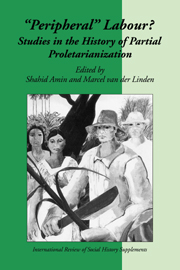Book contents
- Frontmatter
- Contents
- Introduction
- Colonialism, Capitalism and the Discourse of Freedom
- The Barriers to Proletarianization: Bolivian Mine Labour, 1826–1918
- Labour, Ecology and History in a Puerto Rican Plantation Region: “Classic” Rural Proletarians Revisited
- Coal and Colonialism: Production Relations in an Indian Coalfield, c. 1895–1947
- “Capital Spectacles in British Frames”: Capital, Empire and Indian Indentured Migration to the British Caribbean
- Unsettling the Household: Act VI (of 1901) and the Regulation of Women Migrants in Colonial Bengal
- Sordid Class, Dangerous Class? Observations on Parisian Ragpickers and their Cités During the Nineteenth Century
- Notes on Contributors
“Capital Spectacles in British Frames”: Capital, Empire and Indian Indentured Migration to the British Caribbean
Published online by Cambridge University Press: 14 October 2009
- Frontmatter
- Contents
- Introduction
- Colonialism, Capitalism and the Discourse of Freedom
- The Barriers to Proletarianization: Bolivian Mine Labour, 1826–1918
- Labour, Ecology and History in a Puerto Rican Plantation Region: “Classic” Rural Proletarians Revisited
- Coal and Colonialism: Production Relations in an Indian Coalfield, c. 1895–1947
- “Capital Spectacles in British Frames”: Capital, Empire and Indian Indentured Migration to the British Caribbean
- Unsettling the Household: Act VI (of 1901) and the Regulation of Women Migrants in Colonial Bengal
- Sordid Class, Dangerous Class? Observations on Parisian Ragpickers and their Cités During the Nineteenth Century
- Notes on Contributors
Summary
They came in ships.
From across the seas, they came.
Britain, colonising India, transporting her chains
from Chota Nagpur and the Ganges Plain.
Westwards came the Whitby,
The Hesperus,
The Island-bound Fatel Rozack.
Wooden missions of imperialist design.
Mahadai Das, “They Came in Ships”As “They Came in Ships” by the Guyanese poet Mahadai Das suggests, scholarship on indentured immigration is not an exclusively academic concern in Caribbean countries with sizeable Indian populations. An international conference on Indian diaspora held recently at the University of the West Indies, Trinidad and Tobago, was not only covered by national news media, but also attended by Trinidadians (almost exclusively of Indian descent) unattached to the university, some of whom also contributed papers, helped to organize and run it. In Guyana and Trinidad and Tobago, contestations over national identities are grounded in and self-consciously refer to a shared historical archive. This includes conventional, written material such as colonial administration records, newspapers, travelogues, and memoirs that reflect the concerns of privileged observers: government officials, reporters and editors, missionaries, labour activists, historians, anthropologists. It also includes memories and accounts of personal and group experiences by others in these societies, transmitted orally or through other popular media, and they all simultaneously and unevenly undermine as well as authorize each other.
Two issues continue to frame debate on the history and politics of Indian immigration and cultural diversity in the English-speaking Caribbean. One, on which the first part of this article focuses, concerns interpretation of emancipation and its aftermath.
- Type
- Chapter
- Information
- Peripheral LabourStudies in the History of Partial Proletarianization, pp. 109 - 134Publisher: Cambridge University PressPrint publication year: 1997



